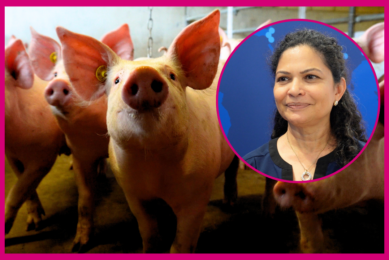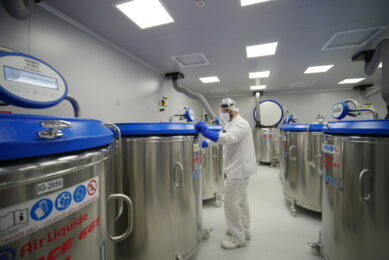Novus Technical Forum evaluates trace mineral programs
Celebrating 7 Years of Growth, Novus International (Thailand) Co., Ltd held a technical forum at the Landmark Hotel in Bangkok on August 18, 2010. The program “Health Through Nutrition – Evaluating Trace Mineral Programs” included a number of international and regional Novus speakers as well as presenters from Kasetsart University, Thailand.
Presentations covered topics relevant to the poultry, aquaculture and swine industries.
Research by Novus International has proven Mintrex chelated trace minerals are more bioavailable than other organic and inorganic mineral forms. This superior bioavailability of Mintrex helps producers and nutritionists address key production challenges including gut health, nutrition, structural integrity and protection against oxidative stress, while reducing the environmental deposition of trace minerals from poultry, swine and aquaculture systems.
Keynote speaker, Dr. Jim Richards Novus’s Manager of Cell Biology Research and Distinguished Science Fellow presented “Trace Mineral Bioavailability and Functional Effects in Animals”. Dr. Richards explained to attendees how increasing mineral absorption enhances the amount of minerals available to an animal’s cells and tissues. This, in turn, better supports the thousands of mineral-dependent enzymes and other proteins that do the biochemical work in the animal.
“There has been a great deal of confusion regarding minerals and their effectiveness”, stated Dr. Richards. “One of the main reasons to feed an organic trace mineral (OTM) over an inorganic trace mineral (ITM) is the delivery of more minerals to the blood and tissues of the animal. “It is essential that producers, nutritionists and veterinarians understand that because OTMs use various ligands, not all OTMs accomplish this goal equally”.
Mintrex features two molecules of the methionine hydroxy analogue (HMTBa) – the active ingredient in Alimetand MHAfeed supplements – chelating the zinc (Zn), manganese (Mn) or copper (Cu).
The 2:1 HMTBa metal structure found in Mintrex is more stable through the relatively low pH of the upper gastrointestinal tract. This stability reduces mineral disassociation and thus minimizes loss to antagonists in the digesta, such as phytate, or other trace or macrominerals. ”Increasing more mineral availability for absorption in the small intestine, allows the producer to reduce inclusion rates – “so less really is more,” Richards explained. “Additionally, the HMTBa organic ligands are fully available as a methionine source to the animal so when formulating with Mintrex, HMTBa can be entered into the nutritional matrix being calculated.”
Novus’s Global Poultry Market Manager, Dr. Scott Carter presented “Functional Benefits and Bird Performance”. He explained that Mintrex can maintain or even improve performance as measured by the traditional metrics of bodyweight gain, feed conversion ratio (FCR) and mortality. Carter explained during his presentation that trials and commercial success has supported the additional benefits of Mintrex in other areas of the customer’s value chain like processing. According to research, a supply of highly available trace minerals plays an important role in preventing foot pad lesions, leg problems and skin scratches. Carter also explained that the use of Mintrex chelated trace minerals at about one quarter of the commercial inclusion rate used for ITMs has significantly improved footpad health for many customers.
“Footpad lesions can not only influence producer income, but are also a gateway for bacterial infections – resulting in increased condemnations, risk of E. coli/Campylobacter and food poisoning. Even in live markets where footpads are not sold, foot pad problems can lead to reduced feed intake, slower weight gain and decreased uniformity”.
Dr. Carter added that recent experiments in Brazil have proven greater skin integrity, enhanced gut health and fewer skin abrasions, resulting in a reduction of downtime for processors and fewer downgrades. “Mintrex Zn and Mintrex Cu have both been demonstrated a significant increase for intestinal breaking strength in broilers,” said Carter.
Maximizing Sow Lifetime Reproductive Performance
“Maximizing Sow Lifetime Reproductive Performance” was presented by Dr. Felipe Navarro, Global Prok Market Manager, Novus International. “With over 16,000 sows up to parity seven and over 40,000 sow data points, this is arguably the of the world’s largest mineral swine study” commented Navarro. “The three year trial evaluated the effect of Mintrex Zn, Cu and Mn for improved lifetime sow production in a commercial farm. Overall, sows fed Mintrex had significantly improved production with about 2 pigs more than the control, reduced sow removal rates due to locomotion from parities 2 – 5 and improved piglet birth weights.”
The final presentation to attendees was, “Optimizing Trace Minerals for Shrimp and Fish” given by Novus Regional Aqua Nutritionist, Dr. Jesus Venero The presentation included the results of an recent Texas A&M University experiment conducted by Dr. Addisson Lawrence. The study included juvenile white shrimp which were fed diets containing phytic acid at levels comparable to commercial diets. These diets require 3 to 4 times the quantity of inorganic zinc or copper to produce similar growth levels of diets containing Mintrex Zn or Mintrex Cu.











